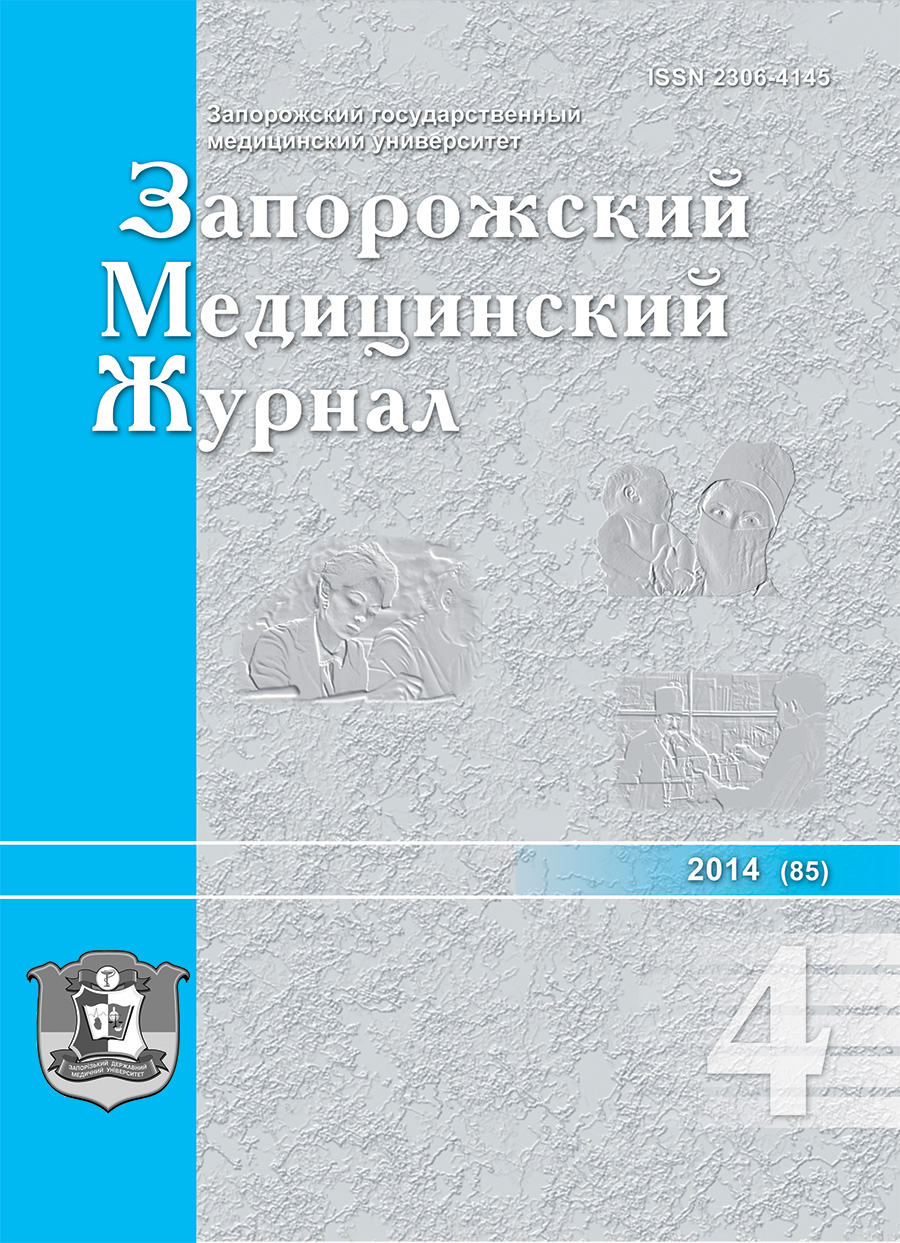Characteristics and dynamics of cognitive impairment in patients with primary and recurrent cerebral ischemic hemispheric stroke
DOI:
https://doi.org/10.14739/2310-1210.2014.4.27383Keywords:
cerebral ischemic hemispheric stroke, acute period, cognitive impairmentsAbstract
Acute cerebrovascular disease is a global medical and social problem of the modern angioneurology, occupying leading positions in the structure of morbidity and mortality among adult population of the world. Ischemic stroke – is one of the most common pathology. Today this disease took out the world pandemic. More than 16 million new cases of cerebral infarction recorded in the world each year and it “kills” about 7 million of people.
About 111,953 cases of cerebral stroke were registered in 2013 in Ukraine. Cognitive impairment, t hat significantly disrupt daily activities and life of the patient, is one of the most significant post-stroke complications that have social, medical and biological significance.
Aim. The purpose of this investigation was to study features and dynamics of cognitive impairments in patients with primary and recurrent cerebral hemispheric ischemic stroke (CHIS ) in the acute stage of the disease.
Materials and methods. To achieve the aim, and the decision of tasks in the clinic of nervous diseases Zaporozhye State Medical University (supervisor - Doctor of Medicine, Professor Kozelkin A.) based on the department of acute cerebrovascular disease were performed comparative, prospective cohort study, which included comprehensive clinical and paraclinical examinations of 41 patients (26 men and 15 women) aged 45 to 85 years (mean age 66,4 ± 1,4 years) with acute left-hemispheric (2 patients) and right - hemispheric (39 patients) CHIS . First up was a group of 28 patients (19 men and 9 women, mean age 65,6 ± 1,6 years), who suffered from primary CHIS. The second group consisted of 13 patients (7 men and 6 women, mean age 68,1 ± 2,5 years) with recurrent CHIS. The groups were matched by age, sex, localization of the lesion and the initial level of neurological deficit.
All patients underwent physical examination, neurological examination. Dynamic clinical neurological examination assessing the severity of stroke was conducted using a NIHS scale. Neuropsychological examination included verification of the existence and structure of the cognitive impairments using scales Montreal Cognitive Assessment (MoCA), Mini-Menthal State Examination (MMSE), Frontal Assessment Battery (FAB) on the 1st -3rd and 10 - 13th day of the acute period of the disease. Outcome of the acute period of the disease was assessed by the modified Rankin scale .
All patients underwent a CT scan (Siemens Somatom Spirit, Germany) of the brain and laboratory investigations. The obtained data were processed using the program Statistica 6.0 (StatSoft., USA ) and software package Microsoft Excel.
It was detected that patients with recurrent ischemic supratentorial stroke are characterized with lower summary score by Mini-Menthal State Examination, Montreal Cognitive Assessment and Frontal Assessment Battery scales than those with first stroke episode. It was revealed that moderate cognitive disturbances are prevailed in the structure of cognitive disorders in primary stroke, while in recurrent brain ischemia mild and moderate dementia is dominated. Transitory type of perception-gnostic field violations in primary ischemic supratentorial stroke was established. The leading cognitive domains which are associated with expressed cognitive disfunction in patients with recurrent brain ischemia were detected.
Conclusions. The patients with recurrent CHIS were characterized by more severe cognitive impairment in the acute period of the disease, so a primary CHIS we can considered as a main risk factor for the progression of cognitive disorders in a specified group of patients.
References
Bachynskaya, N. Yu. (2010) Sindrom umerennikh kognitivnikh narushenij [Syndrome of mild cognitive impairment]. Neyro News, 2/1, 12–17. [in Ukrainian].
Levin, O. S., Dudarova, M. A., & Usolceva, N. I (2010) Diagnostika i lechenie postinsultnikh kognitivnikh narushenij [Diagnosis and treatment of post-stroke cognitive impairment]. Consilium Medicum, 12(2), 5–12. [in Russian].
Shakhparanova, N. V., & Kadikov, A. S. (2011) Nejroprotektornaya terapiya v reabilitacii bolnykh s postinsul`tnymi kognitivnymi narusheniyami v profilaktike demencii pri khronicheskikh sosudistikh zabolevaniyakh mozga [Neuroprotective therapy in the rehabilitation of patients with post-stroke cognitive impairment and dementia in the prevention of chronic vascular diseases of the brain]. Atmosfera. Nervnye Bolezni, 1, 23–27. [in Russian].
Advani, S., & Sundar, U. (2010) Post-stroke cognitive impairment after 3 months. Annals of Indian Academy of Neurology, 13(1), 42–46.
Khedr, E. M., Hamed, Sh. A., El-Shereef, H. K., et al. (2009) Cognitive impairment after cerebrovascular stroke: Relationship to vascular risk factors. Neuropsychiatric Disease and Treatment, 5, 103–116.
Makin, S. D. J., Turpin, S., Dennis, M. S., et al. (2013) Cognitive impairment after lacunar stroke: systematic review and meta-analysis of incidence, prevalence and comparison with other stroke subtypes. J Neurol Neurosurg Psychiatry, 84, 893–900.
Allan, L. M., Rowan, E. N., Firbank, M. J., et al. (2011) Long term incidence of dementia, predictors of mortality and pathological diagnosis in older stroke survivors. Brain, 134, 3716–3727. doi: 10.1093/brain/awr273.
Riordan, H. J., & Flashman, L. A. (2011) Vliyanie insulta na kognitivnuyu sferu (Impact of stroke on cognitive functions). Mezhdunarodniy nevrologicheskiy zhurnal, 2(40), 57.
Downloads
How to Cite
Issue
Section
License
Authors who publish with this journal agree to the following terms:
Authors retain copyright and grant the journal right of first publication with the work simultaneously licensed under a Creative Commons Attribution License that allows others to share the work with an acknowledgement of the work's authorship and initial publication in this journal. 

